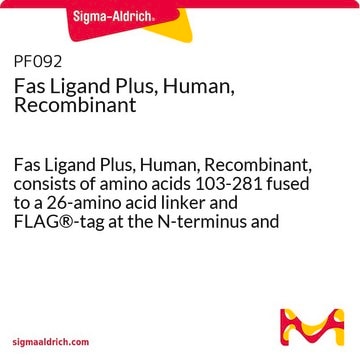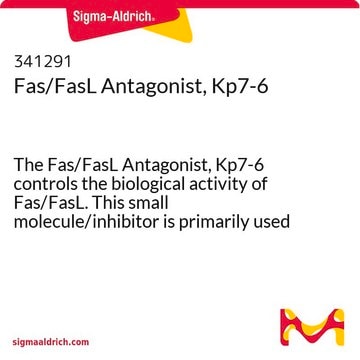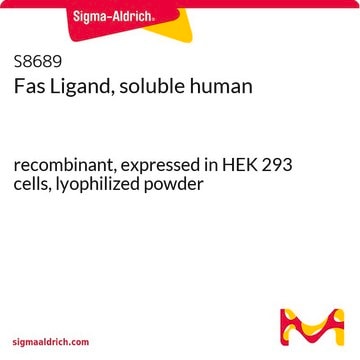PF033
Fas Ligand, Human, Recombinant
Fas Ligand, Human, Recombinant, consists of amino acids 103-281 fused at the N-terminus to a tag-linker peptide. Binds to human, rat, and mouse Fas.
Sinónimos:
CD95L, CD178
Iniciar sesiónpara Ver la Fijación de precios por contrato y de la organización
About This Item
Código UNSPSC:
12352202
NACRES:
NA.77
Productos recomendados
recombinante
expressed in HEK 293 cells
Nivel de calidad
Análisis
≥95% (SDS-PAGE)
formulario
lyophilized
potencia
50 ng/mL ED50 (A20 cells)
no contiene
preservative
reactividad de especies
human, mouse, rat
fabricante / nombre comercial
Calbiochem®
condiciones de almacenamiento
OK to freeze
impurezas
<0.1 EU/μg Endotoxin (EU/μg purified protein)
Condiciones de envío
wet ice
temp. de almacenamiento
−20°C
Descripción general
Recombinant, human, Fas ligand consisting of amino acids 103-281 fused at the N-terminus to a tag-linker peptide. Binds to human, mouse, and rat Fas. The recombinant protein is produced in HEK293 cells. Useful for cytotoxicity assays.
Fas/APO1/CD95 (37-42 kDa), a member of the Tumor Necrosis Factor/Nerve Growth Factor (TNF/NGF) receptor family, is an apoptosis-signaling surface receptor known to trigger apoptotic cell death. Homology exists between the Fas and TNF receptors including a region called the "death domain" which is required to propagate the apoptotic signal. The signal activates a family of cysteine proteases, or caspases, which systematically lead to cell destruction. Genetic defects in the Fas system have been shown to lead to autoimmune disorders while increased activity or deregulation contributes to the pathology of diseases such as AIDS.
Fas/APO1/CD95 (37-42 kDa), a member of the Tumor Necrosis Factor/Nerve Growth Factor (TNF/NGF) receptor family, is an apoptosis-signaling surface receptor known to trigger apoptotic cell death. Homology exists between the Fas and TNF receptors including a region called the "death domain" which is required to propagate the apoptotic signal. The signal activates a family of cysteine proteases, or caspases, which systematically lead to cell destruction. Genetic defects in the Fas system have been shown to lead to autoimmune disorders while increased activity or deregulation contributes to the pathology of diseases such as AIDS.
Recombinant, human, Fas ligand consisting of amino acids 103-281 fused at the N-terminus to a tag-linker peptide. Binds to human, rat, and mouse Fas.The recombinant human soluble Fas ligand recognizes the Fas receptor in human, rat and mouse. Extracellular domain of human FasL, 103 - 281 fused at the N-terminus to a tag linker peptide.
Envase
Please refer to vial label for lot-specific concentration.
Advertencia
Toxicity: Standard Handling (A)
Forma física
Lyophilized from PBS.
Reconstitución
Following reconstitution, aliquot and freeze (-20°C). Stock solutions are stable for up to 3 months at -20°C.
Reconstitute in 50 μl H₂O to yield a final stock concentration of 100 µg/ml. Further dilute in culture medium containing 5% FCS immediately prior to use.
Otras notas
Noguchi, K. et al. 1996. Oncogene13, 39.
Golstein, P. et al. 1995. Cell81, 185.
Katsikis, P. et al. 1995. J. Exp. Med.181, 2029.
Nagata, S. et al. 1995. Science267, 1449.
Thompson, C., 1995. Science267, 1456.
Watanabe-Fukunaga, R. et al. 1992. Nature356, 314.
Golstein, P. et al. 1995. Cell81, 185.
Katsikis, P. et al. 1995. J. Exp. Med.181, 2029.
Nagata, S. et al. 1995. Science267, 1449.
Thompson, C., 1995. Science267, 1456.
Watanabe-Fukunaga, R. et al. 1992. Nature356, 314.
The soluble Fas ligand kills APO-1/Fas-sensitive cells at a concentration of >50 ng/ml. For example, cell death results when 5 x 105 murine A20 B lymphoma cells are incubated with 50-500 ng/ml of the recombinant human soluble APO1/FasL (aa 103-281) for 16 h at 37°C.
Información legal
CALBIOCHEM is a registered trademark of Merck KGaA, Darmstadt, Germany
Código de clase de almacenamiento
11 - Combustible Solids
Clase de riesgo para el agua (WGK)
WGK 1
Certificados de análisis (COA)
Busque Certificados de análisis (COA) introduciendo el número de lote del producto. Los números de lote se encuentran en la etiqueta del producto después de las palabras «Lot» o «Batch»
¿Ya tiene este producto?
Encuentre la documentación para los productos que ha comprado recientemente en la Biblioteca de documentos.
Nuestro equipo de científicos tiene experiencia en todas las áreas de investigación: Ciencias de la vida, Ciencia de los materiales, Síntesis química, Cromatografía, Analítica y muchas otras.
Póngase en contacto con el Servicio técnico






